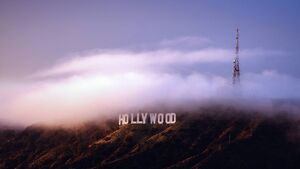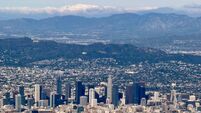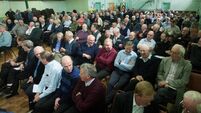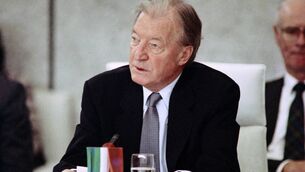Hollywood has seen one of its slowest years

The Hollywood sign is viewed during a clearing storm on January 22, 2024 in Los Angeles, California. Picture: Mario Tama/Getty Images
There have been times in my life when I have seriously doubted my own sanity, wondering why I chose to do the most stupid thing when the easier path was clearly better and way more sensible.
One winter evening, en route west from Naas where I was working, I deliberately ignored the ‘road closed’ signs before my Landcruiser got stuck in a snow drift in the Slieve Bloom mountains. I spent a frozen eternity berating myself with no idea what to do and could only shout into the gloomy conifers.
With petrol running low, I rang mountain rescue who were less than enamoured by my stupidity. Apparently two other idiots had gotten lost on the Kinnitty side and they were busy looking for them. The gruff Midland voice advised me to stay put and they would get to me in some hours. He didn’t sound too pushed and I didn’t blame him.
More in embarrassment than need, I decided I would find a way down on my own and rang a friend who advised me to urinate on the snow to free the tyres. That ploy failed for multiple silly reasons. However, his advice to throw whatever I had under the wheels for grip worked better and I jolted the SUV back onto the road using the contents of my overnight bag. With most of my clothes now buried in the Slieve Bloom snowy darkness I made my way down the mountain, coming perilously close to sudden drops that would periodically open in front of me.
After an eternity I could feel the tyres on the gravel again and passed a few houses before finally coming to another ‘road closed’ sign manned by a Kinnitty native smothered in a padded jacket and floppy cap. Doing my best, nonchalant attitude I rolled down the window.
"Well," I said.
"Well," he replied, squinting at me. "You’re not trying to go over the mountain?"
I laughed.
"No, sure isn’t it closed!"
"True enough," he replied, "but there is some fool stuck up there – he rang us earlier squealing for help."
There was a silence and I cheerfully nodded.
"Aren’t they everywhere!" I ventured.
My interrogator maintained his suspicious glare under his hat.
"Yeah, anyway you’ll have to go around."
I agreed and waved a little too vigorously before driving off into Kinnitty village. There I called again 999 to quickly inform them that the eejit had made it off the mountain, before going into a bar and having a strong whiskey. The road back to Galway was uneventful, except for a brief period of cursing when I remembered my best suit was also now forever buried in the Laois-Offaly mountains.
A decade ago, aside from non-union actors working mainly in commercials, there were an estimated 100,000 actors in Los Angeles with only about one-fifth of them working at any one time. Since then, the lot of actors here is believed by many in the industry (there is only one ‘industry’ in Los Angeles – the film industry) to have deteriorated.
The effective shuttering of studios and the shut-down of filming during Covid-19, with the subsequent strikes by the actors’ union (SAG-Aftra) and the Writers Guild of America (WGA) has resulted in production work moving out of state or even overseas (including Ireland). Attractive tax credits and monetary incentives have not been adequately matched by the Californian authorities, so not alone are production companies slow to return to Tinseltown, many are doubling down on their out-of-state investment. With a major reset happening among online streaming companies such as Netflix, 2024 has been one of the slowest years for the industry in Los Angeles, with high unemployment among actors, crew and casting professionals. ‘Survive till 25’ has been the mantra echoing throughout casting workshops and online chats, hoping that next year would see some sort of return of work to Hollywood.
All this means that my wife and I picked one of the worst times to move to Los Angeles. Fortunately, both of us have other non-industry incomes but I needed to establish relationships and get a good agent if I aspired for an acting career here. In the absence of available auditions, the best way for an actor to meet with casting directors, agents or managers is to do the workshop circuit.
Officially, ‘pay to play’ is a controversial practice where aspiring actors are asked to pay a fee for an audition, role, or other opportunities. This practice is illegal in California and is considered exploitative. Thus, workshops are solely opportunities for actors to learn about the industry and audition techniques from industry professionals. I have found them exhilarating, being able to perform a live scene in front of a casting professional and get feedback – in a world where almost all auditions are now being done by recording yourself at home and then submitting the ‘self-tape’ file to production. Aside from meeting casting directors, these workshops also feature agents who are licensed to obtain work for their clients (hopefully me) and are seeking new additions to their talent rosters. In a world of diminishing acting opportunities, getting an agent is vital.
Yet a month ago, I found myself again ‘doing a Kinnitty’ and self-imploding as I auditioned for an agent with one of the largest agencies here. My best performances for industry people tend to feature the charming or witty Irish priest/cop/lawyer/teacher. However, for some mad reason, in the immediate aftermath of Donald Trump’s election win, instead of the easy path, I decided instead to act out a scene from the iconic play , which I had performed in Galway theatre. In particular, I re-enacted a monologue from a vile, racist character who ranted against a minority ethnic group whom he saw as sub-human.
I think the same impulse to push the limits of playing safe that drove me into the Midland mountains a decade ago now pushed me to show this agent I could also play darker roles. However, as I launched into my spiel, becoming angrier and more bitter in my attempt to convince my fellow jurors that ‘those people’ were only murderous animals, I glimpsed at the agent’s face and saw something in his look. As I concluded, wiping the spit from my mouth, he stared at me for what seemed like three midnight masses, before slowly uttering: "Why would you pick... that scene?"
I turned his name around in my head, horrifyingly realising that he may be Jewish and perhaps thought I chose this scene because of that. A rising panic quickly found my mouth telling him about the ‘Weimer Republic’ and how even in 1930s Germany, the arts were flourishing. My brain looked on in shock, as I began second-guessing he had seen an antisemitic, Irish-accented rant disguised as an actor’s audition.
I rambled on about how it was important to understand a racist’s motivations in utterly failing to get out of the hole I was digging for myself. Finally, as I eventually ran out of words, there was a long pause and the agent leaned forward.
"Thank you for explaining all that to me… now let me advise you to never, never….never do that scene again in a session like this."
Stutteringly, I agreed but just before I exited, my brain had one last self-emasculating burp as I asked:
"Can I send you on my materials for consideration?"
He reacted as if I had stung him with a confused wasp.
"I think you just did," he replied.
Later, I had another strong whiskey, but at least I didn’t have to call mountain rescue this time.





